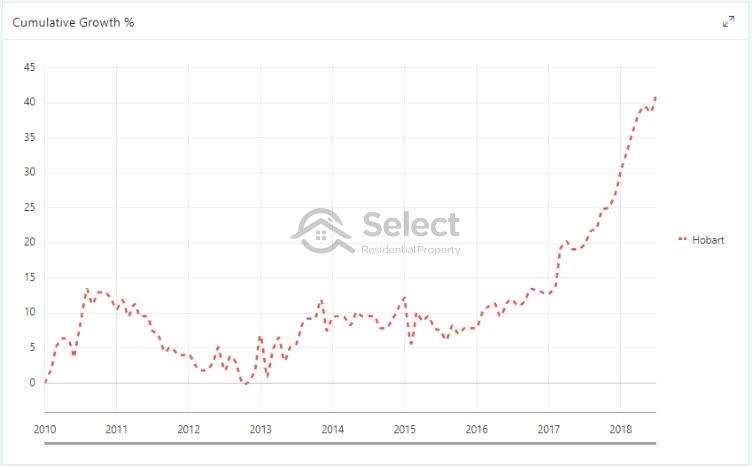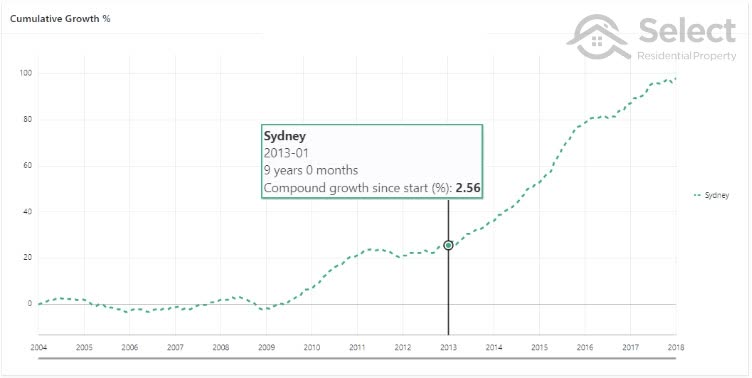All Topics / General Property / Expert Bust #20 Don't buy at the bottom
Experts say you should buy at the bottom. Even amateurs have figured out that would be nice.
Problem is, I wasn’t alive 230 years ago. Prices have well and truly moved on since the bottom.
Perhaps that’s not the “bottom” they’re referring to. Maybe it’s more of a dip than the genuine bottom.
So, should I buy the 1st month I see any negative growth – a dip? If not, how many months does a market have to lie dormant before I know it’s the bottom?
Even with hindsight it doesn’t help. Examine this chart of Hobart’s growth.

The bottom was in 2012. But the best time to buy was in 2017. If you bought in 2012, for 4 or 5 years you would’ve had growth around the rate of inflation. In 2017 growth was about ten times faster.
History has shown it’s bad advice to buy at the bottom. Markets stay flat for a long time. They sit on the bottom for years.
A better time to buy would be well after the bottom has passed. Admittedly, you miss out on a bit of the growth. But you miss out on all of that flat period.
Sydney was well and truly in boom stage in 2014. But it was flat for a very long time prior. Buying at the bottom would not have worked back in 2005.

And soon after Sydney started growing, experts started claiming Brisbane would follow. It’s only just starting to take off now. That’s a long time to wait holding a negatively geared property.
I heard some claim Perth was about to recover from its 2015 dive as early as in 2017! Even now, I’m not advising clients to buy in Perth. Not that it’s bad, just that other parts of the country are better.
Property moves very slowly. If you’re watching it closely, you’re not gonna miss it when it takes off.
Jeremy Sheppard
https://selectresidentialproperty.com.au/I don’t like crystal ball gazing… in other words, I don’t try to “time the market” as I have no confidence that I will get that right.
Experts get them wrong the whole time.
Media keeps on hyping it up but gets them wrong all the time.
Economists get them wrong the whole time.
Business Analysts get them wrong the whole time.
So what makes me think I am any smarter than those experts?
The culture where I come from, we speak of “Heaven” and “Earth”. There is no way I can control Heaven but I can build my Earth. The analogy is like as a farmer, you can select your location, make sure your land has good quality soil, has reach water resource, you use high quality farming products, etc… but you can’t control there will be a drought this year or there won’t be a flood next year.
In terms of property investing, “timing the market” is akin to “try to control the Heaven” and it just won’t work 99% of the time. Therefore, instead of trying to “time when is it the best time to buy”, you should always allow yourself some level of buffer when you buy. That is, you need to make sure that you have a level of “profit / buffer” even if the market growth is 0%.
eg: Instead of buying at 250K and “hope the value will increase the next year”, why not buy at 150K and spend 50K to build the value up to 250K? That way, you spend 200K but got yourself a property with 250K value, so even if the growth is 0% the next year, you still have that 50K manufactured growth built into it. If the value of property dropped from 250K to 220K, that’s still 20K buffer you have to protect yourself. Whereas if you buy at 250K this year and the value drops to 220K the next year, then you are losing money. Similarly, if you buy at 250K and the value increases to 270K the next year, that’s 20K increase. Whereas if you spend 150K + 50K but manage build the value up to 250K, then an increase to 270K the next year means you have 70K profit.
I can’t control “Heaven”, but I will build resilience with “Earth” so I have enough buffer so there is a baseline amount of money I make even if there is 0% growth in the market. Any growth bigger than 0% = bonus money.
You must be logged in to reply to this topic. If you don't have an account, you can register here.






